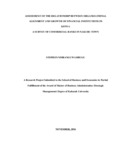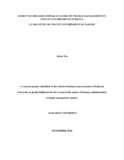ASSESSMENT OF THE RELATIONSHIP BETWEEN ORGANIZATIONAL ALIGNMENT AND GROWTH OF FINANCIAL INSTITUTIONS IN KENYA A SURVEY OF COMMERCIAL BANKS IN NAKURU TOWN
Abstract
Since independence, Kenya’s banking sector has continued to grow particularly in regard to inclusiveness, efficiency, and stability. However, in the recent past, the sector has witnessed a number of challenges manifesting in some commercial banks posting losses while others collapsing. Organizational alignment as an important factor can explain to a great extent the growth and survival or failure of the organizations in a competitive environment like the banking sector. The present study assessed the relationship between organizational alignment and growth of commercial banks in Nakuru town, Kenya. Specifically, the study examined the relationship between leadership alignment, organizational culture alignment, and organizational structure alignment on one hand and growth of commercial banks on the other. The study was guided by four theories which included contingency theory, trait theory, organizational theory, and Greiner’s growth model. The study employed a cross-sectional survey and used census data. All the managers in charge of the 35 branches of commercial banks currently operating in Nakuru town comprised the target population. This study used a structured questionnaire to collect data from the respondents. The research questionnaire was subjected to a pilot test in order to determine its validity and reliability. The Statistical Package for Social Sciences computer software was used for data processing and analysis. Both descriptive and inferential statistics were used in the analysis. Descriptive statistics took the form of frequencies, percentages, and standard deviations. Inferential statistics took the form of correlation analysis and multiple regression analysis. The results of the analyses were presented in tables. The relationship between leadership alignment and organizational growth was found to be positive, weak and not significant (r = 0.034; p > 0.05). The relationship between organizational culture alignment and organizational growth was revealed to be positive, weak and not significant (r = 0.156; p > 0.05). The study found that the relationship between organizational structure alignment and organizational growth in commercial banks was positive, moderately strong and significant (r = 0.494; p < 0.05). The study also revealed that leadership alignment, organizational culture alignment and organizational structure alignment can explain 58.0% of organizational growth in commercial banks. The findings further indicated that organizational structure alignment was the most important facet of organizational alignment in as far as growth of commercial banks was concerned. It was concluded that leadership alignment was not very important in enhancing growth of commercial banks. The study further concluded that organizational culture alignment was the most important type of alignment in enhancing growth of commercial banks. The study also inferred that organizational structure alignment was important in enhancing growth of commercial banks in Nakuru town. The study recommended that commercial banks in Kenya ought to have measurable objectives against which they can benchmark their growth. It is advisable for commercial banks to have well-defined cultural dimensions that can distinguish them from their rivals in the banking sector. It is further recommended that the organizational structure of commercial banks should be flexible enough to mitigate the challenges emanating from bureaucratic bottlenecks.
Collections
Related items
Showing items related by title, author, creator and subject.
-
STRATEGY ALIGNMENT WITH VALUE CHAIN FOR SUSTAINABLE GROWTH IN TECHNOLOGY RELATED INDUSTRIES
KIPTOO, BETT SAMWEL (2013-10)The threat come from cloths from Asian countries for the high and middle income bracket and “mitumba” for low income which we can generalized that the main threat is from substitute products that have flooded the market. ... -
ALIGNING VIRTUAL LEARNING TECHNOLOGY ENGAGEMENT AND ECONOMIC DEVELOPMENT – A CASE OF INSIDE CAMPUS
Bernard, Ogolla O. (Kabarak University, 2018-04)Economic development in the context of education is the practice and philosophy of generating measurable economic returns in communities through the institutions of learning engagement in the provision of education and ... -
EFFECT OF ORGANIZATIONAL CULTURE ON CHANGE MANAGEMENT IN COUNTY GOVERNMENTS IN KENYA A CASE STUDY OF COUNTY GOVERNMENT OF NAKURU
TOO, ALICEN (2018-11)Change is an inevitable part of any growing industry. The forces of change are brought about by the political, social, technological, economic and legal environment in which all organizations operate in. The study therefore ...




